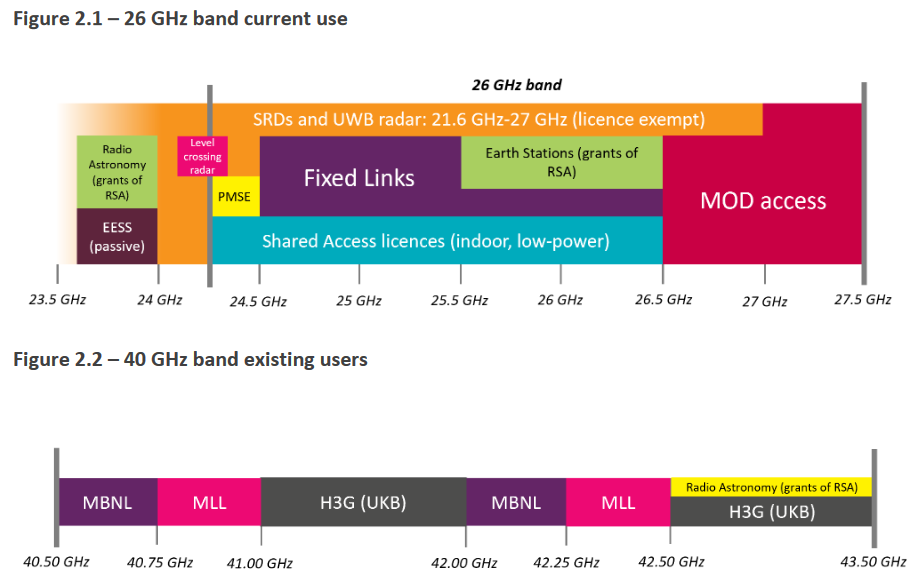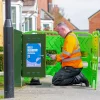Ofcom Consult on Opening 24GHz and 40GHz Bands to 5G Mobile

The UK telecoms regulator has today proposed to make a “large amount” of millimetre wave (mmWave) spectrum available across the 26GHz and 40GHz bands for use by mobile technology, including 5G services. Such bands could help to deliver multi-gigabit mobile broadband speeds, but achieving good coverage is a costly obstacle.
Ofcom has already auctioned off and released various 5G friendly mobile bands between 700MHz and 3.8GHz (example) to EE (BT), O2 (VMO2), Vodafone and Three UK, which reflects the same sort of bands that mobile operators have been harnessing since the advent of the first 3G and 4G mobile data networks some years ago.
Naturally, the more spectrum frequency that a mobile operator can access, the more data it can push to customers for faster speeds. The higher frequencies (e.g. 26GHz) are thus attractive because they provide lots of extra spectrum frequency for data to be sent and received at extremely fast speeds (e.g. multi-Gigabit performance is much easier), but the catch is that such signals are easily disrupted (weak) and don’t travel very far.
Advertisement
Put another way, any mobile operator that wants to build a 5G (or even future 6G) network using the mmWave bands would need to create an extremely dense (and thus expensive) network in order to ensure wide coverage. In practice, this tends to restrict the usefulness of such bands to serving densely populated areas (e.g. city shopping malls, airports, events etc.) or to support fixed wireless access (FWA) style broadband links to specific homes and businesses. Some parts of the proposed bands also have existing users.

The 26GHz and 40GHz Bands
Ofcom’s new consultation clearly recognises that mmW bands and any associated mass market applications are “still at an early stage worldwide,” but they believe the spectrum has the potential to deliver “significant benefits” by enabling large increases in wireless data capacity and speeds.
As a result, the regulator is now looking to release a large amount of spectrum frequency in both the 26GHz (24.25 to 27.5GHz) and 40GHz (40.5 to 43.5GHz) bands.
Advertisement
What Ofcom are proposing – in brief
We want to enable opportunities for a wide range of users and applications across the country to access mmWave spectrum for new uses.
To do this in the 26 GHz band (24.25-27.5 GHz), we are proposing to make a combination of citywide and local licences available:
• In the major towns and cities, where we expect the highest volume of mmWave deployment (‘high density areas’), we propose to:
i) assign local licences on a first come, first served basis in the lowest 850 MHz of the band, using our Shared Access licensing framework; and
ii) auction city/townwide licences for upper 2.4 GHz of the band.
• Elsewhere in the UK, we expect deployments to be sparser (‘low density areas’), and so we propose to assign local licences on a first come, first served basis for all of the 26 GHz band through the Shared Access licensing framework.
Existing fixed point-to-point links which currently operate in the 26 GHz band could receive interference from new uses, and this would likely constrain deployments of these uses in high density areas. Noting that these fixed links could be accommodated in other spectrum bands, we propose to revoke fixed link licences for the 26 GHz band in and around high density areas, giving five years’ notice of revocation. Fixed links that operate elsewhere in low density areas would remain in the band. We expect that other existing users of the 26 GHz band would be able to coexist with new uses.
For the 40 GHz band (40.5-43.5 GHz), we are consulting on options to make spectrum in this band available. The 40 GHz band is already ‘block assigned’, and currently licensed to Hutchinson 3G UK Limited (H3G), Mobile Broadband Network Limited (MBNL), and MLL 40 GHz Limited (MLL).
However, the terms of their licences do not permit mobile use. We are seeking stakeholders’ views on the following options: (a) varying existing licences to allow current licensees to deploy mobile services in the band, (b) revoking existing licences and re-allocating the spectrum alongside the 26 GHz band, and (c) combinations of variation and revocation.
The fact that Three UK, which is one of the four major mobile operators, already holds a block of the 40GHz band could potentially create competition concerns further down the line – assuming Ofcom does enable them to harness it for 5G, without revoking and re-releasing it first. In this case, Ofcom warns that it “may be appropriate to place a ‘precautionary cap’ on the amount of 26 GHz spectrum that H3G could acquire in the auction.”
Historically, mobile operators have almost always tended to clash over such debates, which often ends up triggering legal threats and delays to the auction process. We’re not yet sure if the same will become true for the tricky mmW bands, but it’s certainly possible, even though they’re likely to be regarded by operators with a lower importance level than the 5G bands that have already been released.
The new consultation is due to close for responses on 18th July 2022. After that, Ofcom plan to publish a statement in Q3 2022/2023 their high-level authorisation approach, including their approach to defining high density areas and to existing licensees in the 26 GHz band. This statement will also include their provisional conclusion in relation to existing licences in the 40GHz band.
Assuming all goes well (hah), then Ofcom expects to make the aforementioned mmWave spectrum available for new uses by 2024. But we wouldn’t be at all surprised if it took a bit longer than that.
Advertisement
Mark is a professional technology writer, IT consultant and computer engineer from Dorset (England), he also founded ISPreview in 1999 and enjoys analysing the latest telecoms and broadband developments. Find me on X (Twitter), Mastodon, Facebook, BlueSky, Threads.net and Linkedin.
« Future UK Trade Deals May Add Piracy Website Blocks by ISPs
Cloud Gaming UK ISP ZYBRE Goes Live on MS3’s FTTP Network »






















































This is true 5G, curreny Sub-6 is sub par at best
My concerns with mmWave 5G being made available is simply it will only be available to those who’s devices are compatible with the technology and not available to every 5G capable device out there.
Also the cost of providing such a dense network to provide such a service, would it result in higher charges that the operators would pass back to their customers to reclaim the investment made into the technology?
I’m open to being corrected though.
I imagine it’ll only be made available in areas with high densities of people very close by, and potentially very high footfall.
It won’t be worth the necessary investment to build enough masts to get many areas covered.
Might well see a 5G Turbo option for those that actually spend long enough close to one of these to use it to full potential.
This will reinvigorate the various 5g protest campaigns